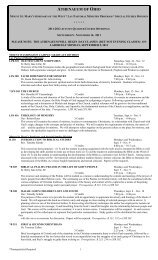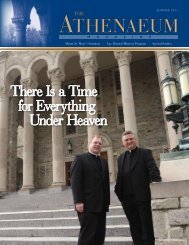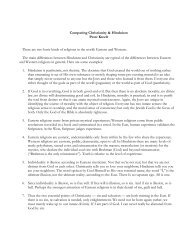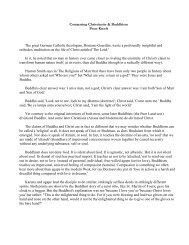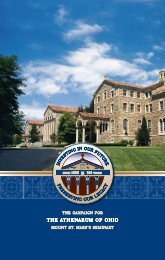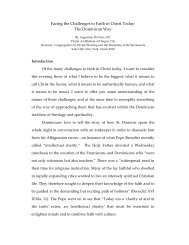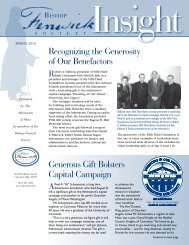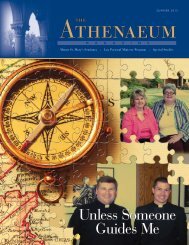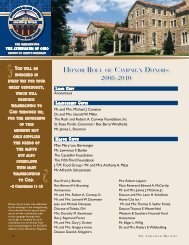Notes from Gathered for the Journey Six (6) essays David McCarthy
Notes from Gathered for the Journey Six (6) essays David McCarthy
Notes from Gathered for the Journey Six (6) essays David McCarthy
Create successful ePaper yourself
Turn your PDF publications into a flip-book with our unique Google optimized e-Paper software.
I. Scripture and <strong>the</strong> ChurchAre Catholics ―fundamentalist‖?In this section, <strong>McCarthy</strong> defends a critical (i.e. using modern exegetical methods)approach to Scripture as outlined in <strong>the</strong> Vatican II (1965), Dei Verbum: DogmaticConstitution on Divine RevelationThe Incarnation of God in Christ sets <strong>the</strong> paradigm—<strong>the</strong> Word of God (Scripture) shares<strong>the</strong> same incarnational paradigm—various authors, diverse cultural settings and so <strong>for</strong>th.―As Dei Verbum explains, ―:<strong>the</strong> words of God, expressed in human language, have beenmade like human discourse, just as of old <strong>the</strong> Word of <strong>the</strong> eternal Fa<strong>the</strong>r, when he took toHimself <strong>the</strong> weak flesh of humanity, became like o<strong>the</strong>r men.‖ (DV, #7) p. 45But, <strong>the</strong> Scripture is acknowledged as ―teaching firmly, faithfully, and without error thattruth which God wanted to put into <strong>the</strong> sacred writings <strong>for</strong> <strong>the</strong> sake of our salvation.‖(DV, #11) p. 46.Serving <strong>the</strong> Truth of SalvationSo, <strong>the</strong> deep truth speaks to us, leading to our salvation in <strong>the</strong> various, diversenarratives we call Sacred Scripture—beginning with <strong>the</strong> Pentateuch thru <strong>the</strong>histories, <strong>the</strong> prophets <strong>from</strong> Job thru Maccabees, <strong>the</strong> Gospels all <strong>the</strong> way toRevelation.The key is <strong>the</strong> phrase ―<strong>for</strong> <strong>the</strong> sake of our salvation.‖Jesus: ―I am <strong>the</strong> Way, <strong>the</strong> Truth and <strong>the</strong> Life‖―…<strong>the</strong> biblical word of salvation, precisely through <strong>the</strong> limitations of human words,reveals God’s full self-communication to us in Jesus Christ. Our human words are <strong>the</strong>medium of <strong>the</strong> divine message. Essential to <strong>the</strong> message of salvation is that our frailhumanity becomes part of <strong>the</strong> proclamation of <strong>the</strong> kingdom of God.‖ (Emphasis added, p.46)II. Salvation HistoryWhat is God’s relationship to <strong>the</strong> World?Now, we turn to <strong>the</strong> salvation and its narration through time we call ―salvationhistory.‖ We can understand, it seems, why Almighty God, Lord Yahweh in <strong>the</strong>Hebrew Scriptures always identifies Himself as ―<strong>the</strong> God of Abraham, Isaac andJacob.‖God inspired Holy Scripture—and is <strong>the</strong> life-giving Spirit in scripture—as ameans to bring His truth to each of His children‘s‘ hearts.[―..<strong>the</strong> Lord and Giverof Life‖ our Creed]Fundamental Moral Theology Page 2 of 54Class <strong>Notes</strong> – Fa<strong>the</strong>r Michael Seger



